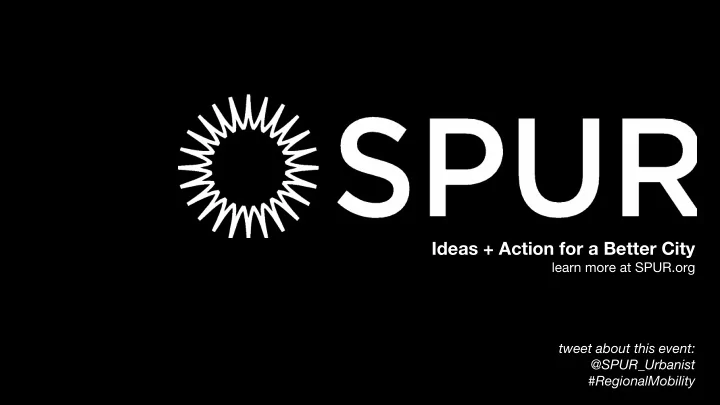

Ideas + Action for a Better City learn more at SPUR.org tweet about this event: @SPUR_Urbanist #RegionalMobility
Excellent Cities Mobility planning for vital, attractive and healthy cities Bas Govers Program Director Excellent Cities Mobility Engineer Goudappel Coffeng
The Netherlands
Our credentials in mobility-planning • Strong growth in mobility • Cost-efficient (public)transport systems • The worlds’ highest use of cycling • The worlds’ transport-safest country • Healthy, liveable, attractive and economic flourishing cities • Getting the most out of space and infrastructure: Intelligent traffic management
Bay Area versus Randstad
Differences in Mobility
Attractive and liveable cities are vital cities 1985 2017
Integrated mobility strategy Mobility Planning Land Use Planning Urban Form Street Design Street Design Buildings
Hierarchy of Networks • International network • High-speed trains • Interregional network • Intercity trains • Metropolitan network • Metro, lightrail, commuter rail • Local network • Trams, buses, cycling
Four Strategies for Mobility hubs
The economic attractors
Central stations as a place of experience Central station Arnhem Central station in Rotterdam
Re-organize car networks to create space for other modes and civic life.
Parking strategy: offering choice
Daily commute by car
The user-experience….from P+R
To the station…
At the station
On the platform and in the train
From Amsterdam Central…
to the office.
Key elements 1. A competitive metropolitan public transport network in terms of speed, frequency, reliability and quality. 2. A safe and inviting cycling network (local and regional) 3. A comprehensive approach in PT and cycling creating an integrated and competitive mobility- option 4. Integrated mobility solutions (MAAS) in mobility hubs 5. A multi-layered Parking – policy: Park+Ride, Park+Bike, Park+Walk and Park+Stay 6. Attractive and mixed urban zones (A-zones) 7. Transit oriented development in zoning, corridors and nodes 8. Behavioral change by financial stimuli
Mobility hubs Utrecht Reorganize mobility for new inner city urban development – the example of Utrecht (the Netherlands) Lucas van der Linde MSc Consultant Urban Mobility Planner for Goudappel Coffeng
Utrecht
Utrecht • 340,000 inhabitants à 400.000 in 2030 à 450,000 in 2035 • City chooses for inner city densification without increasing the amount of cars on the network by focusing on other modes 13% 29% 7% 51% Car Transit Cycling Remaining
Mobility zones developed by the local government A Downtown B City C Suburbs
Mobility zones A Downtown Max priority and space for bicyclist/pedestrian B City Recover balance between modes C Suburbs Separation of structures and modes
Utrecht has a need for inner city densification, keeping the amount of car trips equal
Smart Networks Next generation transportation networks • Cycling, walking and transit central, cars only allowed at the edges • Parking garages underground
Mobility HUB
Mobility HUB – Governance • City: responsible for mobility plan • Province: responsible for the public transport plan • State: responsible for the highway Developing neighborhood • Public-private partnership city and developers • Shared interest of government and private developers
Can we make new mobility work Dutch style? Nicole Soultanov, San Jose Project Manager, SPUR
Inter-modality US style Photo credit: SFMTA Photo credit: Sergio Ruiz for SPUR
Inter-modal public infrastructure Photo credit: Bike hub Courtesy: City of San Jose
Diridon Station Source: Diridon Station Area Plan, 2014 Courtesy: California High-Speed Rail Authority
Diridon Station Source: Diridon Station Area Plan, 2014 Courtesy: California High-Speed Rail Authority
Diridon Integrated Station Courtesy: Arcadis Benthem Crouwel for Diridon Partner Agencies Source: Mercury News - April 3, 2018
Photo credit: Sergio Ruiz for SPUR
1 HSR station A district of 450 acres A program leading to: 13 000 units of housing 17M sq ft of offices More economical activity Redesigned public spaces Source: SPL Lyon Part-Dieu
Mobility in San Francisco: Needs and Lessons SPUR Going Dutch: Lessons on Mobility February 5, 2019
The SFMTA: Getting You Where You Need to Go The SFMTA connects San Franciscans with their communities to enhance the economy, environment and quality of life in the city Whether you ride Muni, drive a car, walk, ride a bike, take a taxi or ride paratransit, the SFMTA helps you get where you need to go easily and safely
Muni Ridership: Age Muni Ridership Skews Toward Working-Age Adults San Francisco Muni Riders 80.0% 100.0% 66.7% 79.9% 80.0% 60.0% 60.0% 40.0% 40.0% 17.9% 15.4% 20.0% 15.6% 20.0% 4.6% 0.0% 0.0% 18-64 19-54 Under 18 65 and Over Under 18 55 and Over Trip Purpose Work 54% Social or Recreational 28% Personal Business 1% School 8%
Muni Ridership: Income Muni’s Ridership is Economically Diverse, But Serving a Higher Proportion of the Working Poor 35.0% 28.8% 30.0% 18… 25.0% 18.2% 18.0% 20.0% 16.8% 16.5% 10.2% 14.1% 15.0% 12.1% 9.3% 8.2% 7.8% 7.6% 7.5% 10.0% 6.3% 5.0% 0.0% San Francisco Muni Riders
Ridership: Growing Where We Invest Rapid Network: Average Weekday Boardings • Since 2015, Rapid Network 90,000 ridership has increased by 12,400 80,000 11,700 22 percent 70,000 12,200 14,300 9,000 • Added capacity 13,800 60,000 and increased 11,900 12,800 frequencies 50,000 Improvements 33,000 32,800 40,000 attracted new 29,100 29,300 riders, but also 30,000 6,900 shifted demand 6,000 5,000 20,000 2,600 from local to 10,000 20,600 Rapid service 19,800 18,200 17,800 0 Fall 2015 Fall 2016 Fall 2017 Fall 2018 9R-San Bruno Rapid 5R-Fulton Rapid 38R-Geary Rapid 28R-19th Avenue Rapid 14R-Mission Rapid
Vision Zero: Safe Streets Traffic Violence Disproportionally Impacts Vulnerable Populations • In 2017, half of traffic fatalities occurred on the Vision Zero High Injury Network (HIN) • Forty percent of fatalities occurred in a community of concern – half of which are on the HIN • Among pedestrian fatalities, 50% were people age 65 and older and 79% were people age 50 +
Protected Bikeways
The Times They Are a-Changin’ 52
Thank You sarah.jones@sfmta.com
Ideas + Action for a Better City learn more at SPUR.org tweet about this event: @SPUR_Urbanist #RegionalMobility
Recommend
More recommend